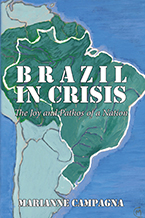July 10, 2020
Brazil in Crisis:
The Joy and Pathos of a Nation
Marianne Campagna
Gavea Press (2020)
ISBN: 978-0-9889108-1-2
New Book Explores Brazil’s Cultural Richness, History, and Current Political Situation
 Anyone who pays attention to global issues knows that Brazil, the world’s largest country physically, and by population eighth largest, has been in a financial crisis for several years. Most Americans, however, do not understand what is at the heart of that crisis, or how recent developments, including the 2018 election of Jair Bolsonaro, have affected it.
Anyone who pays attention to global issues knows that Brazil, the world’s largest country physically, and by population eighth largest, has been in a financial crisis for several years. Most Americans, however, do not understand what is at the heart of that crisis, or how recent developments, including the 2018 election of Jair Bolsonaro, have affected it.
In writing Brazil in Crisis: The Joy and Pathos of a Nation, Marianne Campagna set out to explore what has resulted in Brazil’s current crisis. Today, Campagna is a citizen of the United States, but she spent her formative years growing up in Brazil in the 1950s and 1960s. Not a Brazilian herself, she was born in China to a Chinese father and German mother and immigrated to Brazil as a child. She then immigrated to the United States as a young woman. However, for Campagna, Brazil will always be home. Growing up near Rio de Janeiro, she grew to love the customs, culture, and people of Brazil, and her heart has bled to see the increase in crime and corruption in this land that is also so full of joy, laughter, and rich cultural traditions.
Campagna’s primary focus in this book is to explain the 2018 presidential election in Brazil for readers outside the country so they can understand Brazil’s political process and all the factors that came into play to elect Jair Bolsonaro as Brazil’s president. To fully understand the election, Campagna argues that you must understand Brazil, and so she takes readers on a cultural journey through Brazil, its past and present.
As an American today, Campagna also explores how Brazil is similar and yet different from the United States. Jair Bolsonaro has been named the “Trump of the Tropics” because he admires Donald Trump and in many ways has similar policies. At the same time, the United States is a country that believes in rugged individualism while Brazil is a more collective society. Quoting Mother Teresa, Campagna talks about the loneliness in America where people often do not even know their neighbors, whereas in Brazil there is a true sense of community. The two countries also share a history of having been European colonies and having a legacy of slavery that continues to affect them. These and other comparisons help American readers understand the Brazilian experience better and judge for themselves the merits and shortcomings of this remarkable nation.
Campagna begins her discussion by documenting the burning of the National Museum in Rio de Janeiro in September 2018, just before the national elections. This tragedy resulted in many wonderful artifacts being lost. From there, Campagna launches into a discussion of numerous topics, devoting separate chapters to Brazilian Society, Brazilian Culture, Brazilian History, the Favelas (slums), Corruption, Crime, Fiscal Reality, and finally, the 2018 Presidential Election, and a look at Brazil’s future.
After reading Brazil in Crisis, I found myself eager to learn more about Brazil. I mourned for the poverty of the people who live in the slums, while I admired their ingenuity and ability to live without many of the things we take for granted in the United States. I could hear the Brazilian music and taste the Brazilian food and enjoyed traveling through the streets of Rio as well as through the Amazon. At the same time, I was grateful not to have lived under a military dictatorship or to experience crime and government corruption to the degree it exists in Brazil.
The description of Brazil’s political system was especially interesting. Campagna explains that while Brazil is technically a democracy, it is incomplete as such. Many detrimental forces plague the government and its political system, including corruption at the highest levels. In addition, it has forty-plus parties, so understandably, with each party wanting to pull the country in a different direction, it is difficult to have a consensus on what is best for the country. During elections, if no candidate receives the majority vote, the two parties with the most votes then run against each other in a second election to determine who will be elected. In this scenario, it is possible that a party that had less than 5 percent of the vote initially could be elected to power.
At the same time, Campagna is quick to point out the social class divide in Brazil. There is the upper class and then there is everyone else, who make up the true Brazilian people. These people are warm and friendly and proud of their cultural heritage. Campagna, like most Brazilians she meets who have emigrated elsewhere, misses most the people of Brazil, which is why she continually journeys back to the land of her childhood.
I could say much more about the beauty, magic, and sadness that mark Brazil, but it is best you read about it in Brazil in Crisis. Then take a trip there to experience Brazil for yourself. After reading this book, I think you will be eager to go, and you will realize in the end that we are all citizens of the world and the more we understand about each other, the more we will realize we have more in common with our Latin neighbors than we might think.
For more information about Brazil in Crisis: The Joy and Pathos of a Nation and Marianne Campagna, visit www.ReflectionsFromGavea.com or Amazon.
— Tyler R. Tichelaar, PhD and award-winning author of The Gothic Wanderer and When Teddy Came to Town

